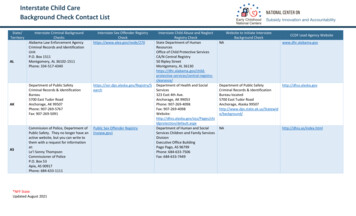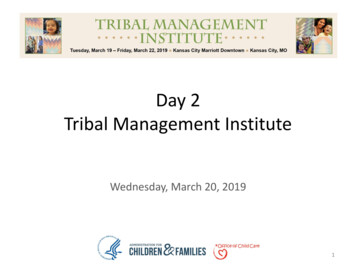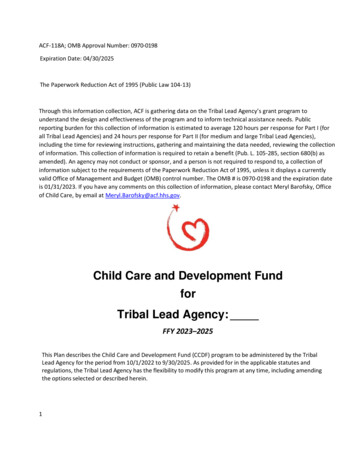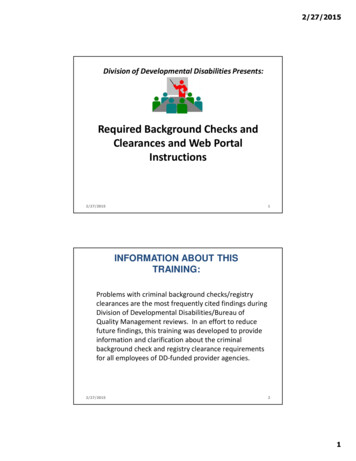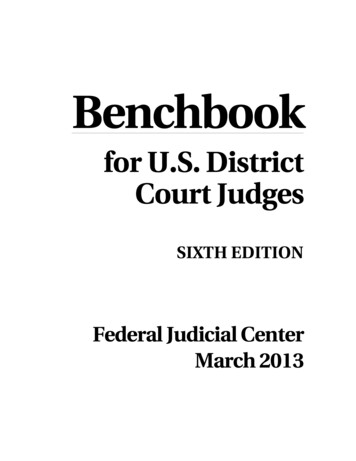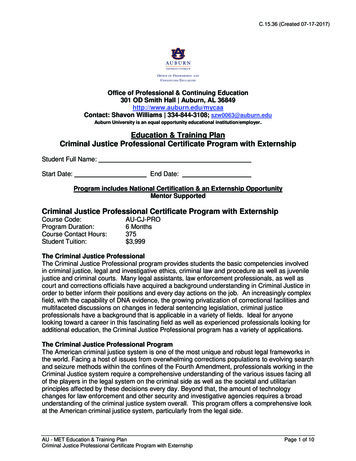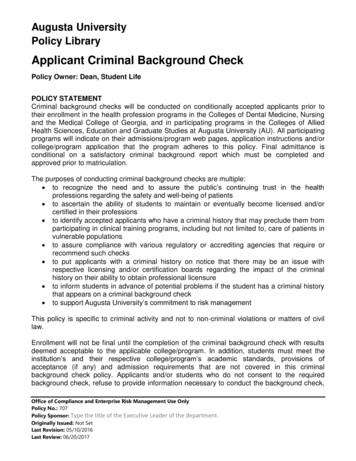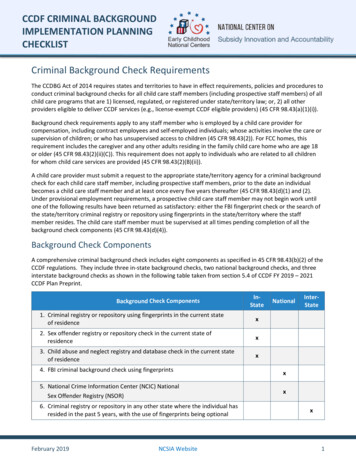
Transcription
CCDF CRIMINAL BACKGROUNDIMPLEMENTATION PLANNINGCHECKLISTCriminal Background Check RequirementsThe CCDBG Act of 2014 requires states and territories to have in effect requirements, policies and procedures toconduct criminal background checks for all child care staff members (including prospective staff members) of allchild care programs that are 1) licensed, regulated, or registered under state/territory law; or, 2) all otherproviders eligible to deliver CCDF services (e.g., license-exempt CCDF eligible providers) (45 CFR 98.43(a)(1)(i)).Background check requirements apply to any staff member who is employed by a child care provider forcompensation, including contract employees and self-employed individuals; whose activities involve the care orsupervision of children; or who has unsupervised access to children (45 CFR 98.43(2)). For FCC homes, thisrequirement includes the caregiver and any other adults residing in the family child care home who are age 18or older (45 CFR 98.43(2)(ii)(C)). This requirement does not apply to individuals who are related to all childrenfor whom child care services are provided (45 CFR 98.43(2)(B)(ii)).A child care provider must submit a request to the appropriate state/territory agency for a criminal backgroundcheck for each child care staff member, including prospective staff members, prior to the date an individualbecomes a child care staff member and at least once every five years thereafter (45 CFR 98.43(d)(1) and (2).Under provisional employment requirements, a prospective child care staff member may not begin work untilone of the following results have been returned as satisfactory: either the FBI fingerprint check or the search ofthe state/territory criminal registry or repository using fingerprints in the state/territory where the staffmember resides. The child care staff member must be supervised at all times pending completion of all thebackground check components (45 CFR 98.43(d)(4)).Background Check ComponentsA comprehensive criminal background check includes eight components as specified in 45 CFR 98.43(b)(2) of theCCDF regulations. They include three in-state background checks, two national background checks, and threeinterstate background checks as shown in the following table taken from section 5.4 of CCDF FY 2019 – 2021CCDF Plan Preprint.Background Check ComponentsInState1. Criminal registry or repository using fingerprints in the current stateof residencex2. Sex offender registry or repository check in the current state ofresidencex3. Child abuse and neglect registry and database check in the current stateof residencex4. FBI criminal background check using fingerprints5. National Crime Information Center (NCIC) NationalSex Offender Registry (NSOR)6. Criminal registry or repository in any other state where the individual hasresided in the past 5 years, with the use of fingerprints being optionalFebruary 2019NCSIA WebsiteNationalInterStatexxx1
CCDF CRIMINAL BACKGROUNDIMPLEMENTATION PLANNING7. Sex offender registry or repository in any other state where the individualhas resided in the past 5 yearsx8. Child abuse and neglect registry and database in any other state wherethe individual has resided in the past 5 yearsxImplementation TimelinesCCDBG reauthorization established September 30, 2017 as the initial due date for implementing the backgroundcheck requirements. Due to significant challenges related to implementing the requirements, all states appliedfor and received extensions through September 30, 2018.Even with this one-year extension, states needed more time to implement the most challenging aspects of thechecks. Therefore, the Office of Child Care (OCC) informed states that they had the opportunity to requestadditional time-limited waivers/extensions of up to two years, in one-year increments (i.e., potentially throughSeptember 30, 2020) for the interstate and NCIC NSOR checks and to clear the backlog of existing providers. Thegranting of these waivers was contingent on meeting milestones requiring specific parts of the checks being inplace for new staff (i.e., FBI fingerprint check and in-state checks).Section 5.4 FY 2019 – 2021 CCDF Plan PreprintNew (Prospective)StaffMilestone/prerequisitefor waiverPossible time limited waiverfor current (existing) staff2. Sex offender registry or repositorycheck in the current state ofresidenceMilestone/prerequisitefor waiverPossible time limited waiverfor current (existing) staff3. Child abuse and neglect registry anddatabase check in the current state ofresidenceMilestone/prerequisitefor waiverPossible time limited waiverfor current (existing) staff4. FBI fingerprint checkMilestone/prerequisitefor waiverPossible time limited waiverfor current (existing) staff5. National Crime Information Center(NCIC) National Sex Offender Registry(NSOR)Possible time limited waiver for: establishing requirements and procedures; and/or conducting checks on all new (prospective) staff; and/orComponents1. Criminal history registry or repositoryusing fingerprints in the current stateof residenceExisting Staff conducting checks on current (existing) staff6. Criminal history registry or repositoryin any other state where theindividual has resided in the past 5years, with the use of fingerprintsb offender registryl7. Sexor repository in anyother state where the individual hasresided in the past 5 yearsFebruary 2019Possible time limited waiver for: establishing requirements and procedures; and/or conducting checks on all new (prospective) staff; and/or conducting checks on current (existing) staffPossible time limited waiver for: establishing requirements and procedures; and/or conducting checks on all new (prospective) staff; and/or conducting checks on current (existing) staffNCSIA Website2
CCDF CRIMINAL BACKGROUNDIMPLEMENTATION PLANNINGComponents8. Child abuse and neglect registry anddatabase in any other state where theindividual has resided in the past 5yearsNew (Prospective)Existing StaffStaffPossible time limited waiver for: establishing requirements and procedures; and/or conducting checks on all new (prospective) staff; and/or conducting checks on current (existing) staffNationally, 35 states met the milestones and received waivers/extensions for more time to implement theinterstate and/or NCIC NSOR checks and/or clear the backlog of existing providers. Two states met allrequirements requested in the plan. Four states received a notice of possible penalty because they did not meetthe FBI fingerprint check milestone. Ten additional states that did not meet the milestones for all requiredproviders were placed on a corrective action plans.OCC also provided states meeting certain conditions the opportunity to apply for time-limitedwaivers/extensions on the provisional employment requirements. A number of states receivedwaivers/extensions or were placed on corrective action plans related to the provisional employmentrequirements.Implementation ChecklistThis checklist contains specific questions concerning key planning steps Lead Agencies are considering, or havetaken, to implement comprehensive criminal background checks. It is organized into five sections. Each questionincludes space for Lead Agencies to record notes and planning steps that are in process.A. State and Local Regulatory Authority: This section reviews Lead Agency statutory and regulatory authorityneeded to conduct criminal background checks.B. Organizational Structure: Using existing infrastructure is critical to the timely and cost-effectiveimplementation of the CCDBG requirements. This section reviews how Lead and other agencyresponsibilities can be aligned within existing organizational structures.C. Disqualifying Crimes and Offenses: The CCDBG Act established a uniform list of disqualifying crimes butdoes not prevent Lead Agencies from adding other crimes, offenses or activities that present risks to thehealth and well-being of children.D. Volume Estimates and Staffing: States will need to estimate the volume of background check requests toensure the availability of adequate staffing resources and infrastructure. This section identifies steps LeadAgencies can take to project the initial and ongoing volume of background checks and reduce the volume ofFBI and interstate criminal background checks that need to be completed.E. Central Background Check Registry: Lead Agencies may need a central registry to record current andhistorical information on criminal, child abuse and neglect, and sex offender findings for child care staffmembers and prospective staff members. This section addresses some of the key questions concerning themodification or development of a centralized background check registry.Section A: State and Local Regulatory AuthorityY/NNotes and Planning Steps1. Has the Lead Agency established regulatory authorityto require background checks for all staff membersand prospective staff members of CCDF providers aswell as licensed, regulated or registered child careproviders regardless of whether the provider receivesCCDF funds?February 2019NCSIA Website3
CCDF CRIMINAL BACKGROUNDIMPLEMENTATION PLANNINGSection A: State and Local Regulatory AuthorityY/NNotes and Planning Steps2. Has the Lead Agency established regulatory authorityto require background checks for individuals employedby child care providers, contractors and others whoseactivities involve the care or supervision of children, orwho have unsupervised access to children?3. Has the Lead Agency established regulatory authorityto require background checks for adults, age 18 andolder, not related to all children in care and residingwith a family child care home provider?4. Has the Lead Agency established regulatory authorityto disqualify individuals that refuse to consent tocriminal background checks or knowingly makematerially false statements in connection withbackground checks?5. Has the Lead Agency established regulatory authorityto disqualify a child care provider from receiving CCDFassistance if they employ a staff member who isineligible for employment?6. Does the Lead Agency have regulatory authority torespond to interstate background checks?7. If your state is a closed record state, has the LeadAgency resolved regulatory issues that would prohibitsharing criminal, sex offender and child abuse andneglect information with other states for CCDFpurposes?8. Has your state established regulatory authority torequire the results of either the FBI fingerprint checkor in-state fingerprint criminal check before the staffmember may begin working, and to require that thestaff member be supervised at all times untilcompletion of all background check components?Section B: Organizational StructureNotes and Planning Steps1. Has the Lead Agency established a process forconducting fingerprint searches of the FBI NextGeneration Identification (NGI) system and the NCICNational Sex Offender Registry (NSOR)?2. What state agency is responsible for conducting instate criminal background checks and interstatecriminal background checks when a child care staffmember resided in another state within the past fiveyears?3. Has the Lead Agency established a process forproviders to submit background check requests anddisclosure authorization forms for staff members andprospective staff members?February 2019NCSIA Website4
CCDF CRIMINAL BACKGROUNDIMPLEMENTATION PLANNINGSection B: Organizational StructureNotes and Planning Steps4. Do child care staff members and prospective staffmembers have adequate access to fingerprintlocations needed to complete in-state and FBI criminalbackground checks?5. Has the Lead Agency considered using Live Scanfingerprint devices to improve the quality offingerprints and to reduce the time it takes for the FBIto respond to background check submissions?6. Has the Lead Agency developed outreach andeducation strategies to inform and seek input fromparents, providers, and the public on implementingthe child care background check requirements?Section C: Disqualifying Crimes and OffensesY/NNotes and Planning StepsY/NNotes and Planning Steps1. Has the Lead Agency reviewed their state’s list ofdisqualifying crimes and offenses, and developed astandardized list of disqualifying crimes that includesthe felony and violent misdemeanors offensesspecified in section 98.43(c)(1) of the CCDFregulations?2. Does the Lead Agency’s list of disqualifying crimesinclude criminal offenses not specifically listed in theAct, such as an individual’s overall criminal history orrecord of pending arrests or criminal proceedings?3. Does the Lead Agency disqualification policyappropriately consider the fitness of individuals thatmay present potential risks to the health and wellbeing of children?4. Has the Lead Agency established fair and reasonabledisqualification practices that consider mitigatingcircumstances for child care staff members whocommitted crimes that do not require mandatorydisqualification, such as individuals who committednon-violent or drug-related crimes in their youth andwho have a long history of no additional criminalactivity?5. Does the Lead Agency have a process for individuals toappeal the accuracy or completeness of backgroundcheck findings?Section D: Volume Estimates and Staffing1. Has the Lead Agency estimated the number of currentchild care staff members for whom providers need tosubmit background checks, and provided thoseestimates to the partnering Criminal Justice agency tocoordinate ways to address increases involume/timeframes?February 2019NCSIA Website5
CCDF CRIMINAL BACKGROUNDIMPLEMENTATION PLANNINGSection D: Volume Estimates and StaffingY/NNotes and Planning StepsY/NNotes and Planning Steps2. Has the Lead Agency developed an initial workloadassessment and distribution strategy for processingthe initial volume of background checks for existingchild care staff members?3. Has the Lead Agency estimated the annual volume ofcriminal background checks following initialimplementation and provided those estimates to thepartnering Criminal Justice agency to coordinate waysto address the increased volume and potential costsand positions allocated to cover the increasedworkload?4. Does your state currently enroll child care staffmembers in the FBI’s Rap Back Service to reduce thevolume of background checks that must be repeatedevery five years? The FBI retains the staff member’sfingerprints when you subscribe to Rap Back andautomatically notifies states of new arrests or criminalactivity that match the fingerprints.5. Has your state considered enrolling in the FBI NationalFingerprint File (NFF) program to reduce the volume ofinterstate criminal background checks that need to becompleted? An FBI fingerprint check satisfies therequirement to perform an interstate check of anotherstate’s criminal history record repository if theresponding state participates in the NFF programbecause the FBI check will search the NFF state’sdatabase directly.Section E: Central Background Check Registry1. Does the Lead or other State/Territory agency have, orneed to develop a central registry that capturescurrent and historical demographic and criminalbackground check information on individualsemployed in the child care workforce?2. Does the existing central registry capture the datarequired for initiating criminal background checks andinforming providers and/or individuals whenbackground checks need to be repeated?3. Does the central registry generate a notice of theresults of the background check to the child careprovider without revealing any disqualifying crime orother related information regarding the individual?4. Does the central registry generate a notice of theresults of the background check to the staff memberor prospective staff member that includes informationrelated to each disqualifying crime in a report andinformation on the appeal process?February 2019NCSIA Website6
1. Has the Lead Agency established a process for conducting fingerprint searches of the FBI Next Generation Identification (NGI) system and the NCIC National Sex Offender Registry (NSOR)? 2. What state agency is responsible for conducting in-state criminal background checks and interstate criminal background checks when a child care staff

